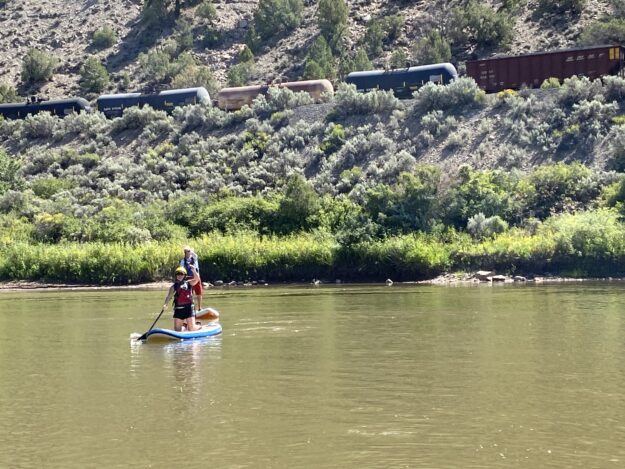Widgetized Section
Go to Admin » Appearance » Widgets » and move Gabfire Widget: Social into that MastheadOverlay zone
Weiser vows to stay vigilant in wake of SCOTUS ruling in favor of oil trains

An oil train above the Colorado River in Eagle County last summer (David O. Williams photo).
Colorado Attorney General Phil Weiser on Thursday issued a forceful statement on the U.S. Supreme Court unanimously deciding in favor of Utah’s Seven Counties Infrastructure Coalition in its legal battle with Eagle County over the Uinta Basin oil train project that would dramatically increase tanker car traffic along the Colorado River.
“Today, the U.S. Supreme Court overturned the lower court’s decision to block a risky scheme to transport waxy crude oil along the Colorado River, right alongside our most critical water resource and posing major risks to Colorado’s Western Slope communities. The court’s opinion allows agencies to ignore the upstream and downstream environmental harms of projects,” Weiser wrote in a statement.
“The proposed project – now allowed by the court’s ruling – lets an out-of-state company build a new 88-mile railway to ship thousands of oil barrels along the river daily. The lower federal court correctly found that the National Environmental Policy Act, or NEPA, requires such projects to be fully informed of all potential environmental hazards before shovels go into the ground. The Surface Transportation Board must still decide other environmental issues that weren’t part of this case. We’ll remain vigilant and deploy every tool available under the law to protect Colorado’s land, air, and water and hold federal agencies accountable to their oversight obligations.”
In 2023, Attorney General Weiser pushed for former U.S. Transportation Secretary Pete Buttigieg to deny an application for taxpayer dollars to support the Uinta Basin Rail Project—calling out its extreme risk to Colorado’s environment and people. He also led a coalition of 16 attorneys general in filing a court brief supporting Eagle County’s case before the Supreme Court.
Weiser is running for governor of Colorado in 2026.
The U.S. Surface Transportation Board, which in 2021 approved the Uinta Basin Railway over the objections of its Biden administration-appointed chairman, also issued a press release on Thursday’s SCOTUS decision, including the following statement from the current Trump administration chairman:
“Over the years, some have sought to abuse NEPA by unlawfully turning a procedural tool into an ideological weapon,” said Board Chairman Patrick Fuchs. “Today’s decision is a victory for common sense, economic growth, and meaningful environmental review. I strongly supported the Board’s approval decision and subsequent legal defense, and I am pleased the Supreme Court has upheld the diligent work of the agency for the benefit of the public.”
A U.S. Court of Appeals later vacated the STB approval, finding there had not been enough consideration under NEPA of upstream and downstream environmental impacts, including potential derailments, wildfires, oil spills and carbon emissions. Project proponents then appealed to the U.S. Supreme Court. All of RealVail.com’s coverage of these issues can be found under the rail tab.
Colorado Newsline reported a potential quintupling of the amount of oil that’s already being shipped through the narrow canyons of the Colorado River on Colorado’s Western Slope. Rail experts have recommended alternative routes through Wyoming, the rail company that was originally tabbed for the Uinta Basin project has now withdrawn, and Colorado has passed its own rail safety laws in anticipation of increased oil train traffic.
Eagle County spent at least $450,000 litigating the case, and Eagle County Commissioner Matt Scherr had this to say prior to Thursday’s SCOTUS ruling:
“No, when we filed the lawsuit, certainly not a consideration,” Scherr told RealVail.com when asked about the potential impacts to NEPA. “Eagle County’s consideration is that we care about climate and … NEPA and how those things go, but our primary consideration is what it always has been — those direct impacts to Eagle County from this potential line [from oil spills and wildfires].”
The active Union Pacific Moffat Subdivision crosses the state from Grand Junction on the Utah border, traveling for about 100 miles along the endangered Colorado River that supplies drinking water for 40 million people in the United States. It passes through Glenwood Canyon, wracked by wildfires and mudslides in recent years, before heading northeast at Dotsero through Gore Canyon, Byers Canyon and the canyons of the Fraser River.
Then the line travels under the Continental Divide through the state-owned, 6.2-mile Moffat Tunnel before heading down into Denver. Once busy with up to 25 coal trains a day, the line has seen a big drop-off in that traffic but still sees about six oil trains a day and could someday see nuclear waste if a northwest Colorado economic development group can push through a waste storage project there to replace lost coal-industry jobs.
State officials, meanwhile, struck a deal with Union Pacific for three passenger trains a day that will ultimately travel between Craig and Denver, in exchange for UP continuing to lease the Moffat Tunnel. It’s unclear how increased oil train traffic or perhaps nuclear materials might impact the state’s passenger plans.
The Uinta Basin decision is yet another in a long line of SCOTUS rulings from the Trump-stacked conservative Roberts’ court that are viewed as anti-environment. Justice Neil Gorsuch recused himself from Thursday’s 8-0 decision because of potential conflicts of interest.
Editor’s note: This is a breaking story that will be updated with additional comments throughout the day.


